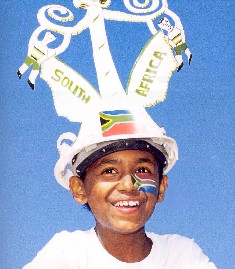South Africans upbeat on 2010
Nozipho Dlamini
9 February 2007South Africans are becoming more realistic in their expectations of the 2010 Fifa World Cup, but are still confident that the event will boost employment and the economy, new research shows.
A comparison of the 2006 polling data from the Human Science Research Council's ongoing 2010 survey shows relatively little change in broad public expectations from those held in 2005.
According to the council's 2010 project leader, Udesh Pillay, the majority of respondents continue to believe that South Africa will be ready to host the event, and that it will have economic and employment benefits for both the country and their area of residence.
However, detailed analysis shows that public attitudes are becoming more nuanced, and respondents more critical about specific issues around 2010.
"In the first survey, 62% of respondents believed that the 2010 Fifa World Cup would ensure economic growth and job creation, and the percentage dropped to 51% in the second survey," Pillay said.
Though this was a substantial decrease, he said respondents who felt that hosting the World Cup would "increase business opportunities" countered this decline.
Pillay said the results suggested that, with the more visible and public-focused planning for the event, respondents were being more specific in their expectations, and not seeing benefits in broad and amorphous terms.
"In other words, South Africans were beginning to be more realistic and discerning about their expectations," he said.
While 57% of respondents believed that their local authority would be able to meet the demands of hosting the event, this also reflected a drop from the 62% of respondents in the first survey.
"Respondents may well feel that failure on the part of their municipalities to deliver basic services over the past year mitigated against them meeting more stringent and demanding 2010 Fifa World Cup obligations in the run-up to the world's biggest soccer spectacle," Pillay explained.
Fear for price increases, crime
In addition, the public's assessment of the main disadvantages of hosting the event showed possibly significant changes over the two-year period.
In the first survey, the largest segment of respondents believed that consumer price increases would be the main drawback of hosting the event, followed by those who believed that it would lead to an increase in crime.
The latest survey shows that these categories are now reversed. Twenty-nine percent of respondents now believe that an increase in crime will be the main disadvantage, followed by 22% of respondents who fear an increase in prices.
Pillay said the pervasive crime situation in the country possibly explained this shift, with respondents probably feeling that hosting the World Cup could provide criminals with a conducive environment.
"Fear of crime was spread reasonably uniformly around the country, although slightly higher among urban formal housing dwellers and among respondents in farming areas," he said.
Thirty-four percent of wealthier respondents cited fear of crime as a major drawback associated with the hosting of the event, compared to 25% and 27% of persons on the "low" and "medium" income categories.
The latest survey also recorded a large increase in public knowledge of South Africa's hosting of the World Cup. Pillay noted that persons living in rural areas continued to display low public knowledge of the event.
While only 8% to 10% of respondents living in urban areas said they did not know that South Africa would host the event, between 15% and 19% of respondents living in either the former homelands or on farms remained unaware about it.
Source: BuaNews













